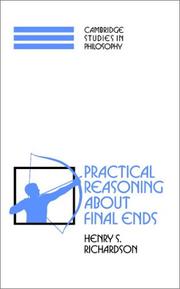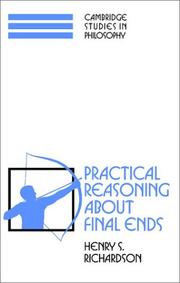| Listing 1 - 10 of 61 | << page >> |
Sort by
|
Book
Year: 1974 Volume: 142 Publisher: Bologna : Il mulino,
Abstract | Keywords | Export | Availability | Bookmark
 Loading...
Loading...Choose an application
- Reference Manager
- EndNote
- RefWorks (Direct export to RefWorks)
Book
ISBN: 2705676260 9791037019240 9782705676261 Year: 2009 Publisher: Paris : Hermann,
Abstract | Keywords | Export | Availability | Bookmark
 Loading...
Loading...Choose an application
- Reference Manager
- EndNote
- RefWorks (Direct export to RefWorks)
'La fin est double et done duplice: but poursuivi (télos) et achèvement (terminus), cesure. En surimpression dans notre langue à la faveur d'une homophonie, la faim projette sa hantise, comme le Cri de Munch, sur le spectaculaire diorama de l'époque. La fin épuiserait la faim. On se demande comment ça pourrait finir. Nombre de scenarii envisagent les derniers jours, le dernier homme. Il n'est pas impossible d'impossible d'imaginer une fin par atélie et par hypertélie asslciées. L'atélie, c'est quand les fins professées par l'économie-monde partent en fumée comme le ou les fameuses épuisées d'entrechocs, de mépris et d'anorexie, et que reste seule, mise ànu par ses célibataires, la machine infernale production-consommation, qui ne se soucie bientôt plus de ses alibis. L'hypertélie (qui causa, nous dit la vulgarisation scientifique, la mort de gigantesques mammifées), c'est quand le prédateur surdimensionné avale la et écrase la terre: la créature terrestre s'immortalise en s'émondant avec son génie génétique et ses prothèses. La fin, ou sens, réserve à la pensée son secret difficile à instruire à chaque grand âge, dans une proportion d'or de fini et d'infini - comme le fornule Pascal dans son énigme: . Comment faire proportion par les temps qui courent? L'alliance radicale de la pensée poétique et de la pensée écologique s'exerce aux paradoxes d'une telle proportion. On en trouve des esquisses dans le présent essai, études et lectures.'
Book
Year: 2010 Publisher: Washington, D.C. : International Monetary Fund,
Abstract | Keywords | Export | Availability | Bookmark
 Loading...
Loading...Choose an application
- Reference Manager
- EndNote
- RefWorks (Direct export to RefWorks)
This paper identifies policy tools to support fiscal consolidation in the years ahead. Its starting point is the analysis in the recent Board papers describing strategies for fiscal consolidation (IMF, 2010a, 2010b), which showed that on current trends, general government debt in advanced countries would rise 36 percentage points of GDP during 2007-14, and that age-related spending (health and pension) would rise rapidly later, further adding to fiscal pressures. Trends are more favorable in emerging economies, but adjustments are needed there too.
Book
ISBN: 1498377963 Year: 2010 Publisher: Washington, D.C. : International Monetary Fund,
Abstract | Keywords | Export | Availability | Bookmark
 Loading...
Loading...Choose an application
- Reference Manager
- EndNote
- RefWorks (Direct export to RefWorks)
This paper identifies policy tools to support fiscal consolidation in the years ahead. Its starting point is the analysis in the recent Board papers describing strategies for fiscal consolidation (IMF, 2010a, 2010b), which showed that on current trends, general government debt in advanced countries would rise 36 percentage points of GDP during 2007-14, and that age-related spending (health and pension) would rise rapidly later, further adding to fiscal pressures. Trends are more favorable in emerging economies, but adjustments are needed there too.

ISBN: 0521464722 0521574420 1139174274 Year: 1994 Publisher: Cambridge : Cambridge University Press,
Abstract | Keywords | Export | Availability | Bookmark
 Loading...
Loading...Choose an application
- Reference Manager
- EndNote
- RefWorks (Direct export to RefWorks)
Henry Richardson argues that we can determine our ends rationally. He constructs a rich and original theory of how we can reason about our final goals. Richardson defuses the counter-arguments for the limits of rational deliberation, and develops interesting ideas about how his model might be extended to interpersonal deliberation of ends, taking him to the borders of political theory. Along the way Richardson offers illuminating discussions of, inter alia, Aristotle, Aquinas, Sidgwick, and Dewey, as well as the work of several contemporary philosophers.
Ends and means --- Practical reason --- Practical rationality --- Practical reasoning --- Rationality, Practical --- Reasoning, Practical --- Reason --- Means and ends --- Ethics --- Philosophy --- Arts and Humanities --- Ends and means. --- Practical reason.
Book
ISBN: 9780674057456 9780674031784 0674031784 0674043146 0674057457 9780674043145 Year: 2010 Publisher: Cambridge: Belknap press of Harvard university press,
Abstract | Keywords | Export | Availability | Bookmark
 Loading...
Loading...Choose an application
- Reference Manager
- EndNote
- RefWorks (Direct export to RefWorks)
In a clear and elegant style, T. M. Scanlon reframes current philosophical debates as he explores the moral permissibility of an action. Permissibility may seem to depend on the agent’s reasons for performing an action. For example, there seems to be an important moral difference between tactical bombing and a campaign by terrorists—even if the same number of non-combatants are killed—and this difference may seem to lie in the agents’ respective aims. However, Scanlon argues that the apparent dependence of permissibility on the agent’s reasons in such cases is merely a failure to distinguish between two kinds of moral assessment: assessment of the permissibility of an action and assessment of the way an agent decided what to do. Distinguishing between these two forms of assessment leads Scanlon to an important distinction between the permissibility of an action and its meaning: the significance for others of the agent’s willingness to act in this way. An action’s meaning depends on the agent’s reasons for performing it in a way that its permissibility does not. Blame, he argues, is a response to the meaning of an action rather than its permissibility. This analysis leads to a novel account of the conditions of moral responsibility and to important conclusions about the ethics of blame.
General ethics --- Ends and means. --- Intention. --- Blame. --- Means and ends --- Blame --- Criticism, Personal --- Attitude (Psychology) --- Ethics --- Philosophy --- Intention --- Moral and ethical aspects --- Moral and ethical aspects. --- Ends and means
Book
ISBN: 110841317X 1108349579 1108332730 Year: 2017 Publisher: Cambridge, England : Cambridge University Press,
Abstract | Keywords | Export | Availability | Bookmark
 Loading...
Loading...Choose an application
- Reference Manager
- EndNote
- RefWorks (Direct export to RefWorks)
This Element defends a reading of Kant's formulas of the moral law in Groundwork of the Metaphysics of Morals. It disputes a long tradition concerning what the first formula (Universal Law/Law of Nature) attempts to do. The Element also expounds the Formulas of Humanity, Autonomy and the Realm of Ends, arguing that it is only the Formula of Humanity from which Kant derives general duties, and that it is only the third formula (Autonomy/Realm of Ends) that represents a complete and definitive statement of the moral principle as Kant derives it in the Groundwork. The Element also disputes the claim that the various formulas are 'equivalent', arguing that this claim is either false or else nonsensical because it is grounded on a false premise about what Kant thinks a moral principle is for.
Ethics. --- Humanity. --- Autonomy (Philosophy) --- Ends and means. --- Kant, Immanuel, --- Means and ends --- Ethics --- Philosophy --- Deontology --- Ethics, Primitive --- Ethology --- Moral philosophy --- Morality --- Morals --- Philosophy, Moral --- Science, Moral --- Values

ISBN: 0521574420 9780521574426 Year: 1997 Volume: *4 Publisher: Cambridge : Cambridge university press,
Abstract | Keywords | Export | Availability | Bookmark
 Loading...
Loading...Choose an application
- Reference Manager
- EndNote
- RefWorks (Direct export to RefWorks)
Doel en middel --- Doeleinden en middelen --- Ends and means --- Fins et moyens --- Means and ends --- Middel en doel --- Middelen en doeleinden --- Fin et moyens. --- Raison. --- Raisonnement. --- Finalite. --- Reflexion (Philosophie) --- Argumentation. --- But (Philosophie)
Book
Year: 2007 Publisher: Carlisle, PA : Strategic Studies Institute, U.S. Army War College,
Abstract | Keywords | Export | Availability | Bookmark
 Loading...
Loading...Choose an application
- Reference Manager
- EndNote
- RefWorks (Direct export to RefWorks)
The U.S. inability -- or unwillingness --to connect strategic ends and appropriate means to accomplish those ends has occurred so often over the past 15 years that one could make a credible argument that it has become a disturbing and pervasive characteristic of the modern American way of war. Beginning with a theoretical discussion of the relationship among ends, means, and strategy, this paper continues by examining specific cases of U.S. intervention from the previous decade and Operation Iraqi Freedom to demonstrate that when the U.S. commits its military forces, success can only be achieved if clear ends are identified, appropriate means are leveraged against those stated ends, and a coherent strategy is developed to coordinate the ends and means.
Strategy. --- Ends and means. --- National interest --- Iraq War, 2003-2011. --- Operation Restore Hope, 1992-1993. --- Operation Allied Force, 1999. --- United States --- Haiti --- Military policy --- Evaluation. --- History
Dissertation
Year: 2022 Publisher: Liège Université de Liège (ULiège)
Abstract | Keywords | Export | Availability | Bookmark
 Loading...
Loading...Choose an application
- Reference Manager
- EndNote
- RefWorks (Direct export to RefWorks)
Mémoire traitant de la misogynie vécue par les personnages féminins des problem plays de Shakespeare ainsi que de leur caractérisation. Ce mémoire analysera la manière dont les personnages féminins des problem plays de Shakespeare sont traités par les personnages masculins, comment ces derniers définissent la valeur des femmes mais traitera aussi de la manière dont elles peuvent elles-mêmes se définir, se comporter et parfois se contredire.
Misogyny --- women --- mistreatment --- worth --- value --- rape --- marriage --- contradictions --- rhetorical skills --- Shakespeare --- Measure for Measure --- Troilus and Cressida --- All's Well That Ends Well --- Problem Plays --- Arts & sciences humaines > Littérature
| Listing 1 - 10 of 61 | << page >> |
Sort by
|

 Search
Search Feedback
Feedback About UniCat
About UniCat  Help
Help News
News